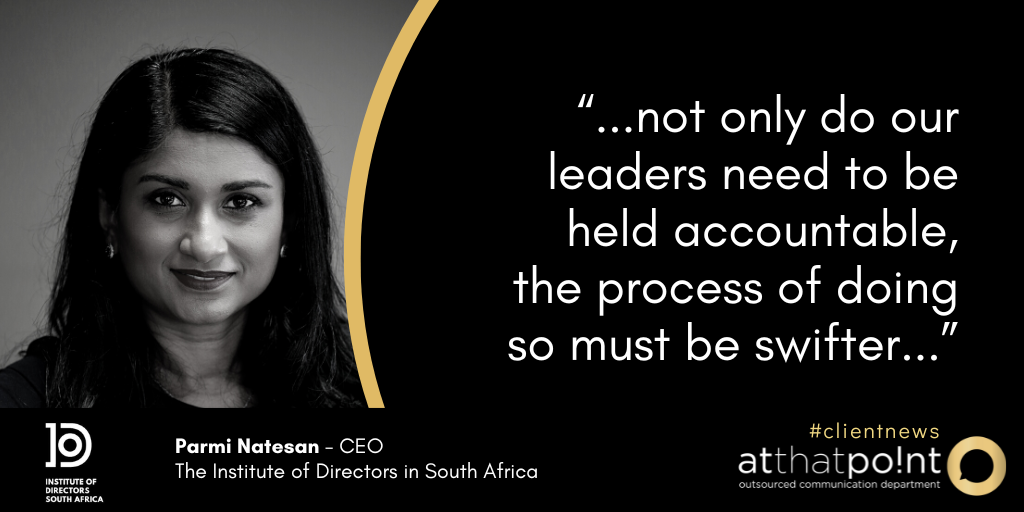 In its final report, the Zondo Commission repeatedly comments that directors of the various captured state entities have not been properly held accountable for the massive damage they have caused to the organisations they were supposed to serve, and thus indirectly to the country as a whole. The Institute of Directors in South Africa (IoDSA) strongly endorses these observations. “The issue of director accountability is one that the IoDSA has been raising in public forums for a number of years. In a letter to the Commission in September 2021, we specifically raised the point that not only do our leaders need to be held accountable, the process of doing so must be swifter,” says Parmi Natesan, CEO, IoDSA. “We recommended the establishment of a constitutional means of alternate dispute resolution to facilitate prompt and effective consequence management both for transgressing directors and those charged with exercising oversight over them.” In its final report, the Zondo Commission maintains that legal processes typically only manage to identify “egregious abuses of public power” when the perpetrators or those that protect them are out of power. The Report also makes the point that the delayed legal process is a “cumbersome, time consuming [sic] exercise”. It therefore recommends that the Companies Act’s 24-month time bar relating to delinquency directors should be extended. This would allow prosecution of, amongst others, the 2014 board of Eskom and two erring South African Airways directors.[1] One of those two directors, Dudu Myeni, the former chair of South African Airways, was declared a delinquent director in 2020 but, says Ms Natesan, only after an extremely time- and resource-intensive process. As a result, director accountability remains rare. The Report then makes a more sweeping recommendation that Government “give consideration to the creation of a statutory offence rendering it a criminal offence for any person vested with public power to abuse public power vested in that person by intentionally using that power otherwise than in good faith for a proper purpose” [emphasis in original].[2] “The IoDSA certainly supports the idea that the 24-month time bar should be extended to allow for holding the numerous defaulting directors identified in the Report to be investigated and prosecuted if necessary. Furthermore, we strongly believe that a more streamlined and rapid process needs to be found,” Ms Natesan says. “An excellent short cut would be to mandate that all directors have to belong to the professional body for directors, so that they could be disciplined under a Code of Conduct and barred from serving as directors if they are found to be in breach of their duties, without the long delays inherent in the legal process. “The benefit would be that the transgressing director would not remain in office while the legal process takes its course—something that would surely have contained the damage caused to SOEs like Eskom and SAA.” ENDS MEDIA CONTACT: Stephné du Toit, [email protected], 084 587 9933, www.atthatpoint.co.za For more information on the IoDSA please visit: Website: www.iodsa.co.za Twitter: @The_IoDSA LinkedIn: Institute of Directors in South Africa Company Page Facebook: Institute of Directors South Africa [1] Judicial Commission of Inquiry into Allegations of Capture, Corruption and Fraud in the Public Sector Including Organs of State, Report: Part VI, Volume 4: Summary of Recommendations 37 (p 95), 12 -3(p 3) and 119 (p 43), available at www.statecapture.org.za/site/files/announcements/672/OCR_version_-_State_Capture_Commission_Report_Part_VI_Vol_IV_-_Recommendations.pdf. [2] Ibid 119 (p 43), 122-6 (p44).
0 Comments
Leave a Reply. |
Archives
July 2024
Categories
All
|

 RSS Feed
RSS Feed